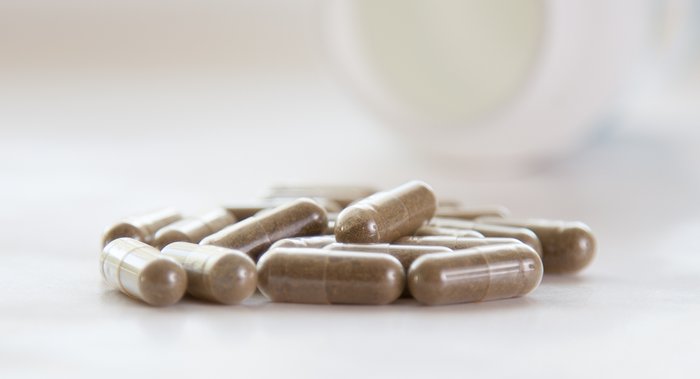Many of us take supplements to help us lift heavier and work out longer, but are there supplements you can take to support your health outside of the gym?
You already understand the importance of sleep. You know you require a certain amount of sleep for your muscles to recover and repair. Sleep is a time when your body and mind are both at rest, and poor-quality sleep sabotages your health, performance, and productivity.
Here are four supplements you can add to your stack to support your sleep—and your results. Use them in conjunction with your nightly routine for truly regenerative and restorative rest.
Magnesium
Magnesium is essential for many enzymatic reactions in the body, including neurotransmitter synthesis.[1] Yet as important as magnesium is for maintaining reactions in the body, it is still one of the leading deficiencies among people in the United States. Studies indicate that deficiencies in magnesium may attribute to behavioral and psychological changes such as anxiety, aggression, and stress.
Magnesium binds to a specialized neurotransmitter called GABA. It's no surprise then that a deficiency of this powerful mineral may be to blame for your sleep troubles.

Research from the University of Geneva found evidence of a possible correlation in magnesium levels and sleep quality. Higher blood magnesium levels resulted in a more restful night's sleep, while magnesium deficiencies resulted in greater restlessness during sleep, as well as increased wake time. The recommendation for supplemental magnesium for adults is 310-420 milligrams, although some studies use doses of up to 500 milligrams per day in elderly people with magnesium deficiency.[2]
It's important to test personal tolerance to magnesium and find the right dosage for your body. Too much magnesium may cause grogginess and irritability the next morning, not to mention gastrointestinal distress. Start with a 200-milligram dose before bed, and pay attention to how you feel each day as you slowly increase the dosage until you find what works best for you.
Ashwagandha
This powerful adaptogenic herb has very recently come to the forefront of current research, thanks to the stressed-out nature of modern life. Ashwagandha is useful for supporting daily stress.[3] This ancient Ayurvedic root can also support normal hormone activity.[4]
Current research of this adaptogen root points to helping aid in a better night's sleep. Although ashwagandha does not possess toxicity except in very high doses, the optimal dosage is between 300-500 milligrams 1-2 times per day, best taken with a meal.
Valerian
Valerian, also known as valerian root, is a familiar and popular sleep supplement. Valerian is most commonly used as an herbal tea supplement but can be found in methylated and capsule forms.
Valerian works as a GABA receptor modulator, and is used to promote tranquility. Studies show valerian can reduce the time it takes you to fall asleep, support sleep quality, and decrease fatigue the following day.[5,6]
Recommended dosage for valerian is one dose of 450 milligrams taken one hour before bedtime. Valerian is known to cause drowsiness, so avoid combining it with other natural sleep aids. If you feel a sleep hangover the next day, reduce the dosage.

Melatonin
Melatonin is known as the "darkness hormone" for its role in circadian rhythms. These rhythms act as the body's natural internal clock and help support hormone levels and metabolism.
Melatonin is one of the most powerful of these supportive hormones in the body. Its levels increase when the sun goes down—hence the above nickname—signaled by a decrease in cortisol, which is partially light stimulated. This increase in melatonin helps promote a deep, relaxing sleep.
Human interaction studies have found melatonin effective in decreasing jet lag, as well as for supporting sleep quality and the normal release of growth hormone at night.[7] There are disagreements over the proper dosage of melatonin, and whether it is better taken regularly or cycled.
Since melatonin works in a negative feedback loop, it's best used for the short-term support of sleep. Use in conjunction with a bedtime routine of setting lights low two hours before bedtime and creating a relaxing atmosphere for sleep. Cycle for 8-12 weeks, then slowly cycle off.
Doses are highly personalized and can range from 0.3-6 milligrams, taken 30 minutes before bed. Melatonin is not a dose-response supplement; more is not necessarily better.
Start by optimizing your sleeping conditions, and using melatonin at the lowest dose. If you feel tired and irritable the next day, it may be necessary to decrease the dosage.
The Bottom Line
Although research into sleep aids is ongoing, and some in the scientific community disagree over exact dosage and efficacy, these supplements are all safe and effective and widely accepted as natural sleep aids. If you struggle with sleep, make sure to create a relaxing bedtime routine to assist these supplements in helping you find a better, more restful rhythm.
References
- Morris, M. E. (1992). Brain and CSF magnesium concentrations during magnesium deficit in animals and humans: neurological symptoms. Magnesium Research, 5(4), 303-313.
- Abbasi, B., Kimiagar, M., Sadeghniiat, K., Shirazi, M. M., Hedayati, M., & Rashidkhani, B. (2012). The effect of magnesium supplementation on primary insomnia in elderly: A double-blind placebo-controlled clinical trial. Journal of Research In Medical Sciences: The Official Journal of Isfahan University of Medical Sciences, 17(12), 1161.
- Kalani, A., Bahtiyar, G., & Sacerdote, A. (2012). Ashwagandha root in the treatment of non-classical adrenal hyperplasia. BMJ Case Reports, 2012, bcr2012006989.
- Raut, A. A., Rege, N. N., Tadvi, F. M., Solanki, P. V., Kene, K. R., Shirolkar, S. G., ... & Vaidya, A. B. (2012). Exploratory study to evaluate tolerability, safety, and activity of Ashwagandha (Withania Somnifera) in healthy volunteers. Journal of Ayurveda and Integrative Medicine, 3(3), 111.
- Barton, D. L., Atherton, P. J., Bauer, B. A., Moore Jr, D. F., Mattar, B. I., LaVasseur, B. I., ... & Morgenthaler, T. I. (2011). The use of valeriana officinalis (valerian) in improving sleep in patients who are undergoing treatment for cancer: a phase III randomized, placebo-controlled, double-blind study: NCCTG Trial, N01C5. The Journal of Supportive Oncology, 9(1), 24.
- Leathwood, P. D., & Chauffard, F. (1985). Aqueous extract of valerian reduces latency to fall asleep in man. Planta Medica, 51(02), 144-148.
- Lemoine, P., Nir, T., Laudon, M., & Zisapel, N. (2007). Prolonged‐release melatonin improves sleep quality and morning alertness in insomnia patients aged 55 years and older and has no withdrawal effects. Journal of Sleep Research, 16(4), 372-380.

